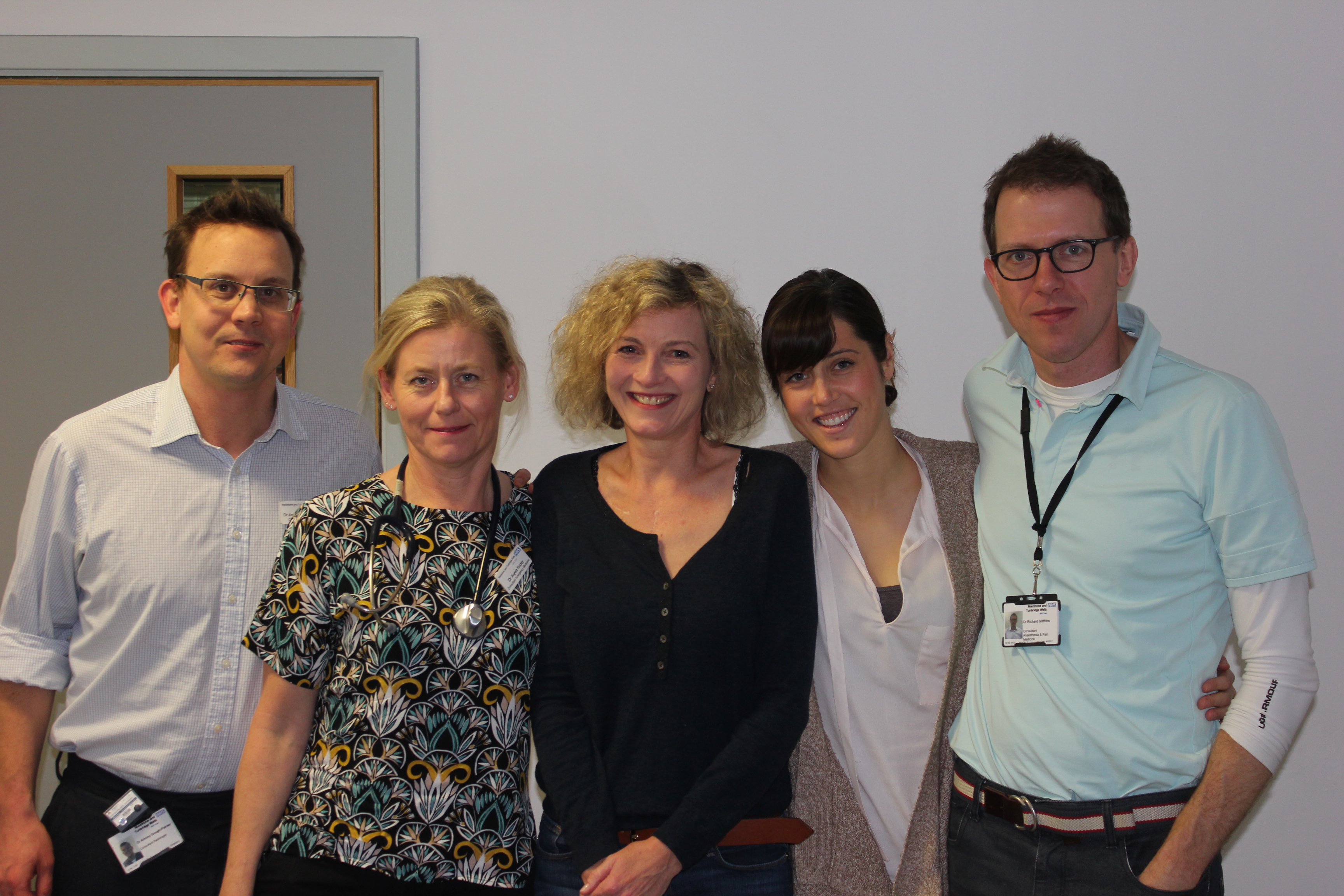
A patient, whose life was saved by the quick actions of staff at Tunbridge Wells Hospital, visited the Emergency Department, last week, to personally thank some of the people who cared for her.
Lorna Arduino, from Sevenoaks, was out walking her dogs on 14 November 2016 when she suddenly collapsed. When she came to, she couldn’t move but managed to call for help from her mobile phone. She was rushed to Tunbridge Wells Hospital Emergency Department where she was seen by A&E Consultant, Dr Angela Feazey, and Emergency Registrar, Dr Megan Purcell-Jones.
They knew immediately that there was something very wrong with Lorna and referred her for an emergency scan to determine exactly what the problem was.
A CT scan of Lorna’s whole body was carried out by Dr Antony Gough-Palmer and it was discovered that Lorna had suffered an aortic dissection – a very serious condition in which the inner layer of the aorta, a large blood vessel branching off the heart, tears. Blood surges through the tear, causing the inner and middle layers of the aorta to separate. It’s an unusual condition for someone as young, fit and healthy as Lorna. Almost 20% of patients with an aortic dissection die before they get to hospital and many don’t survive surgery.
A decision was made quickly to transfer Lorna to King’s College Hospital in London for emergency specialist surgery. Dr Richard Griffiths, Consultant Anaesthetist, accompanied Lorna in the ambulance.
Lorna underwent ten hours of surgery and afterwards, was in a coma for ten days. She spent three and a half weeks in ITU and a total of five weeks in hospital.
Sha said: “Saying thank you will never be enough. It’s absolutely terrifying to be told that you might not see tomorrow but when you’re surrounded by people who are so compassionate and you have total confidence that everything that could be done is being done, it makes a huge difference. They were absolutely amazing.
“I was told by my surgeon at King’s that the reason I am alive is down to the fact that the staff who cared for me at Tunbridge Wells Hospital acted so quickly. I can’t explain how grateful I am.
“My recovery is ongoing but I can walk, swim and take part in gentle exercise, although I get tired easily and have to make sure that I rest regularly and keep my blood pressure down. Having got through something so serious, I fully intend to go out and live my life – and that’s down to the people I was so lucky to have been treated by when I was brought into the hospital last year.”
Dr Angela Feazey said: “It was wonderful for us all to see Lorna. We were absolutely amazed at how well she looks. When she came in to us last year, she had gone from being fine to being catastrophically unwell in a matter of hours and we weren’t at all sure that she would survive. So often, we treat people but don’t find out what happened to them after they leave our care so to be able to give her a hug and hear from her first-hand meant the world to all of us.”
Ends
Further notes:
Lorna Arduino was 45 years old at the time of her aortic dissection. She has three children aged 13, 11 and 9.
Lorna came into meet with Dr Angela Feazey, Dr Megan Purcell-Jones, Dr Antony Gough-Palmer and Dr Richard Griffiths on Thursday 9 November at Tunbridge Wells Hospital.
It should be noted that a number of other staff from Tunbridge Wells Hospital were involved in her care last year but unfortunately were unable to come along and meet her last week.
Photo shows: Dr Antony Gough-Palmer, Dr Angela Feazey, Lorna Arduino, Dr Megan Purcell-Jones and Dr Richard Griffiths.
